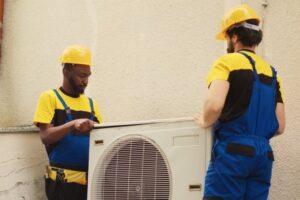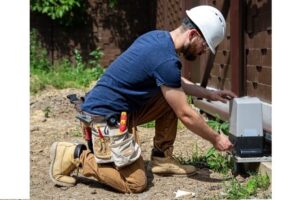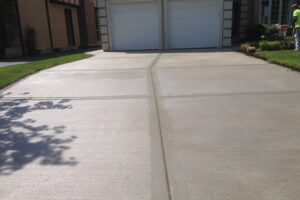Repairing or replacing a central air conditioning unit isn’t cheap, and the best way to prevent unnecessarily large bills isn’t to ignore problems and hope for the best. Instead, address issues as soon as they come up. To that end, this article will focus on some of the most common AC problems, why they happen, and how to resolve them.

Table of Contents
Failure to Turn On
If an air conditioner isn’t working at all, that might seem like cause for serious concern. In fact, fixing air conditioners that aren’t turning on but haven’t been showing any other signs of trouble in the past is usually relatively easy. Before calling a technician, try:
- Checking the thermostat to make sure it hasn’t been switched out of cooling mode.
- Replacing the batteries in the thermostat if it isn’t working.
- Checking the circuit breaker to make sure it’s not tripped.
Homeowners can save a bundle on repairs by resolving these simple problems themselves instead of calling for professional help. Of course, if that doesn’t work, the next step is still to call an HVAC contractor to figure out what’s going on.
Not Blowing Cold Air
Sometimes, air conditioners turn on and seem like they should be working fine, but they never start blowing cold air. The top reason for this problem is a dirty filter blocking the airflow and limiting the cooling power of the system. Changing the filter every month can help to prevent this issue.
Freezing Coils on Outdoor Unit
When the coils of an air conditioner freeze up, that can also stop the unit from providing sufficient cooling power. The coils could be freezing as a result of insufficient airflow, in which case cleaning the filter should still resolve the issue. Otherwise, check to make sure that:
- The temperature outside is above 60 degrees.
- The refrigerant levels are not low.
- There are no refrigerant leaks.
- The condensate lines are clear.
- The coils are clean.
Thaw the coils by turning the unit off before checking for issues. If there are refrigerant leaks or the level is low, call an HVAC contractor. Cleaning condensate drains and coils are tasks that can be handled at home, and if the outdoor temperatures are below 60 degrees Fahrenheit, there’s no good reason to be running an air conditioner.
Concerning New Sounds
Air conditioning units generally operate pretty quietly. When they start making new, loud, or unusual sounds, that’s a sign of something wrong. The type of sound can give homeowners clues as to what the problem is and how it can be resolved.
Hissing Sounds
Hissing sounds are usually caused by refrigerant leaks. Call a contractor to avoid potential exposure to dangerous chemicals.
Buzzing Sounds
Buzzing sounds are usually coming from faulty electrical components. In most cases, an HVAC professional can fix the issue. If it’s a problem with the home’s wiring, fixing it might require the help of an electrician.
Thumping Sounds
Thumping or banging noises usually indicate a problem with the blower or motor assembly. These issues need to be fixed by a professional.
Know When to Call a Pro
Homeowners who aren’t confident in their abilities to diagnose and resolve common AC problems should never delay calling in professional help. While it’s fine to try some of the easy fixes described above, no one without HVAC industry experience should try taking apart AC units or dealing with refrigerant lines. If simple fixes don’t work, call a pro.




